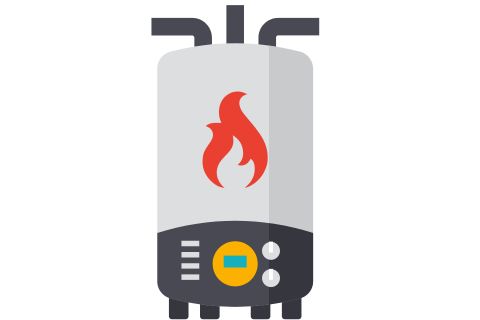Is your boiler losing pressure every day and leaving you in the cold?
This article explains the common causes and provides steps to fix the issue. Learn why your boiler is losing pressure and how to solve it, ensuring your home stays warm.
Boiler Pressure Loss Overview
- Common causes of daily boiler pressure loss include system leaks, faulty pressure relief valves, and bleeding radiators, which can be diagnosed using the pressure gauge and identifying error codes.
- Optimal boiler pressure levels generally fall within 1-2 bars, but specifics can vary by model, so it’s important to consult your boiler’s manual.
- Regular preventative maintenance, including monitoring the pressure gauge and scheduling annual servicing, is crucial to maintaining boiler efficiency and preventing low boiler pressure issues.
Get new boiler quotes online >
Why Is Boiler Pressure Dropping Daily Bad?
Have you ever wondered what’s behind the scenes of your cosy, heated rooms and the hot water that rejuvenates you?
It’s the harmonious balance of boiler pressure, tirelessly working to keep your home’s warmth just right. But when the scales tip, and the pressure falters, your sanctuary of warmth can become a chamber of chills. A combi boiler plays a crucial role in maintaining this balance.
Knowledge is power as we delve into the typical reasons for a boiler losing its equilibrium and how to restore comfort in your home. From sneaky leaks to temperamental valves, we’re on a mission to troubleshoot, repair, and prevent pressure loss.
Understanding Boiler Pressure

Boiler pressure is the beating heart of your heating system, a delicate balance of water and air that circulates warmth through your home. When the pressure is just right, your central heating system hums with efficiency, but lose that balance, and you’ll feel the chill set in.
Grasping this intricate interplay provides your initial shield against the cold. It’s about keeping an eye on that gauge and recognising when your system is crying out for help. So, if your radiators are lethargic and your taps timid, it might be time to take a closer look at your boiler’s pressure.
Optimal Boiler Pressure Levels
The first step to assess your boiler’s health is a quick look at the pressure gauge to check the boiler’s pressure. A happy boiler sits within the sweet spot of 1-2 bars, the green zone of contentment. Stray into the red, and you’re either in a high-pressure predicament or a low-pressure pickle.
But don’t just take the gauge’s word for it; every boiler has its own version of ‘just right’. Check your boiler’s manual to determine your specific model’s optimal pressure range – this serves as a benchmark for optimal boiler performance.
Common Causes of Boiler Pressure Loss
A drop in your boiler’s pressure presents a mystery waiting to be solved. The usual suspects include system leaks, a rebellious pressure relief valve, or the aftermath of bleeding radiators. Let’s put on our detective hats and investigate each of these leads in detail.
Leaks in the System
Leaks are the arch-nemesis of boiler pressure, often sneaking around undetected until they’ve done their damage. A boiler leak could be lurking anywhere – from:
- the pipework
- radiators
- inside walls
- under floors
Keep your eyes peeled for telltale signs like damp patches or discolored paint, the silent screams of your heating system begging for attention. If you encounter a boiler leak, resist the urge for a DIY fix; professional help is necessary here. Even a drop of water can be the sign of a bigger battle brewing inside your boiler.
Get new boiler quotes online >
Faulty Pressure Relief Valve
Next up is the pressure relief valve, a safety sentinel tasked with preventing your boiler from turning into a pressure cooker. When the pressure hits its peak, this valve opens the floodgates, releasing excess water and keeping everything in check.
If this protector fails, you might notice a boiler lose pressure caused by the escape of vital water from the system. This could lead your boiler to lose pressure more frequently. If your boiler’s losing its cool more often than not, it’s time to get a professional to take a look and potentially give that valve an honorable discharge.
Bleeding Radiators

Ever heard the hiss of release as you bleed a radiator? That’s the sound of pressure escaping into the ether. While it’s a necessary ritual to banish cold spots, it can leave your boiler feeling a little deflated.
Don’t be alarmed though; this pressure drop is a battle scar that comes with maintenance. The fix? A quick re-pressurisation will restore your boiler’s vigor, ready to fight the chill another day. To fix low boiler pressure, simply follow the manufacturer’s instructions for re-pressurising.
How to Diagnose Low Boiler Pressure
When your boiler is not functioning optimally, rely on two important tools: the pressure gauge and the boiler’s error codes. Together, they’re the Rosetta Stone for decoding the mystery of low pressure, pointing you in the direction of a fix.
Checking the Pressure Gauge
The boiler’s pressure gauge, a watchful eye on your boiler’s wellbeing, is your first port of call. A reading below 1.5 bar when the system is cold is like a red flag waving, signaling it’s time to take action, as dangerous situations can arise with low boiler pressure.
Remember, patience is a virtue here. Let your boiler cool its heels before you make any moves. Then, monitor the gauge keenly since it could reveal significant insights about your boiler.
Identifying Error Codes
Boiler error codes, a cryptic language all their own, can illuminate the path to pressure perfection. These codes guide you to the core of the issue, whether it’s a malfunctioning valve or a sluggish pump.
But these codes are not just a diagnosis; they’re a plea for help. Whether it’s an F22 fault code calling out for pressure or an F75 lamenting a faulty sensor, heed their call. And if the language is too foreign, a licensed professional can translate and treat your boiler’s woes.
Get new boiler quotes online >
Step-by-Step Guide to Repressurising Your Boiler

Repressurisation is a rejuvenating process for your boiler when the pressure is low. It’s a simple yet elegant dance of valves and gauges that brings balance back to your central heating system.
Locating the Filling Loop
The filling loop, your boiler’s lifeline to the mains water supply, is usually found lounging beneath the boiler like a silver snake ready to infuse life back into the system. It’s the starting point of our repressurisation adventure.
So, seek out this flexible friend, typically sporting valves at either end. If it’s shy and hiding, your boiler’s manual is the treasure map that will lead you to its lair.
Operating the Valves
With the filling loop in sight, the next step is to coax cold water into your boiler’s embrace. Turn the valves, listen for the gentle rush of water, and watch as the pressure gauge climbs back to its happy place.
Exercise caution as your boiler is a delicate machine. Open the taps just enough to let the water trickle in, and once the gauge signals enough, turn them off with the care of a jeweller setting a precious stone.
Ensuring Correct Pressure
Once the valves are tightly shut, your boiler should regain its optimal pressure. But stay vigilant; keep an eye on that gauge over the next few days, as pressure can be a slippery thing.
If the pressure begins to drop below the comfort level, promptly add more water into the system to prevent it from starting to lose pressure, or even worse, losing pressure completely. It’s about finding that equilibrium where your boiler can sigh in relief and get back to warming your world.
When to Call a Gas Safe Engineer
At times, the problems may be more complex than just a basic pressure adjustment. If you find yourself repressurising more often than you fill up your coffee cup, it’s a sign to call in the cavalry – a Gas Safe Engineer.
Persistent issues like frequent drops, visible leaks, or a gauge that just won’t stay put are cries for professional intervention. Don’t play hero; let the experts bring their tools and talents to restore order to your heating universe.
Preventative Maintenance Tips
To prevent future mishaps with your boiler, preventative maintenance serves as a protective measure. Regular checks and timely boiler servicing are the spells that keep the pressure demons at bay.
Regular Pressure Monitoring
Regularly check your boiler’s pressure gauge; it provides insight into the health of your heating system. By keeping a log of pressure readings, you’ll spot trends and pre-empt problems, keeping your boiler in the prime of its life.
Don’t forget, keeping an eye out for corrosion and loose-fitting parts during these checks is also key. It’s the attention to detail that can save you from a cold surprise down the line.
Annual Servicing
Like any faithful steed, your boiler deserves its annual check-up. An engineer’s inspection can uncover hidden issues and ensure everything is running smoothly.
This annual practice is not just for peace of mind; it aims to prolong your boiler’s lifespan and maintain its peak efficiency. From testing water pH levels to cleaning the heat exchanger, it’s the spa treatment that your boiler deserves.
If you don’t get your boiler serviced, it can cause some serious risks further down the line that can damage efficiency, risk your safety and potentially cause breakdowns in the future.
Summary
And so, our journey through the labyrinth of boiler pressure comes to an end. We’ve danced with gauges, flirted with valves, and soothed pressure woes. Remember, your boiler is more than just a metal box; it’s the heart of your home’s warmth.
Embrace the knowledge you’ve gained, wield it with confidence, and never let the chill of uncertainty creep into your home again. With vigilance and maintenance, you and your boiler can enjoy a long, harmonious relationship. Now, go forth and bask in the comfort of your castle, secure in the knowledge that your boiler is your steadfast ally.
Get new boiler quotes online >
Frequently Asked Questions
What is the normal pressure for a home boiler?
The normal pressure for a home boiler is typically between 1-2 bars, with the green zone on the pressure gauge indicating the optimal range. Keep an eye on the pressure gauge to ensure it stays within this range.
What should I do if my boiler loses pressure?
If your boiler loses pressure, you should first check for leaks, inspect the pressure relief valve, and repressurise the system. If the issue persists, it’s best to seek the help of a Gas Safe engineer.
Is low boiler pressure dangerous?
Low boiler pressure isn’t usually dangerous, but it can lead to inefficient heating and a potential shutdown of the boiler, requiring professional repair. Take action if you notice a drop in pressure to avoid inconvenience and additional costs.
How often should I check my boiler pressure?
You should check your boiler pressure once a month to ensure it stays within the recommended range and functions properly.
How can I prevent future boiler pressure loss?
To prevent future boiler pressure loss, it’s important to regularly monitor the pressure, have an annual service by a licensed technician, and promptly address any leaks or issues. Doing so will help maintain your boiler’s efficiency.